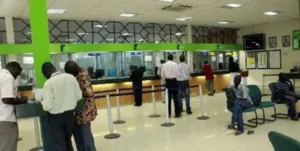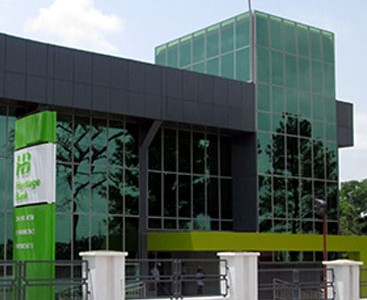The Nigerian Deposit Insurance Corporation (NDIC) made an unexpected visit to several Heritage Bank branches on Monday morning, amid growing rumors of a potential takeover due to financial distress. At least twelve NDIC officials were seen at the Victoria Island, Allen Avenue, Ilupeju, and Ladiopo branches, according to ThePaan News.

One NDIC official at a branch had a memo indicating they were on a “special assignment.” However, the official refused to discuss the memo or give any details.
Two individuals with inside knowledge revealed that the “special assignment” is linked to resolving distress and a possible takeover of Heritage Bank. The Banks and Other Financial Institutions Act (BOFIA) requires the Central Bank to hand over severely under-capitalized banks to the NDIC for distress resolution.
Heritage Bank’s spokesperson did not respond to requests for comments. Three NDIC officials denied the takeover rumors, stating that the visit was just part of a “routine exercise” happening at all banks.
At the time of this report, a spokesperson for the Central Bank was also unavailable for comments. For the past five years, Heritage Bank’s severe debt issues have been widely known, and there has been significant media coverage of its eroded capital base. In December 2023, a Nigerian publication reported that Heritage Bank failed a stress test, leading the Central Bank to urge the bank to find strategic investors for recapitalization. According to a source familiar with the bank’s finances, it has negative shareholder equity of ₦900 billion, meaning its debts far exceed its assets.
Despite an April 2024 deadline to present a recapitalization plan to the Central Bank, Heritage Bank has made no headway in securing funds from investors, according to someone with knowledge of the negotiations.
As these talks stalled, the bank laid off 1,000 employees in April 2024, and customers began facing issues accessing their deposits. ThePaan News first reported these problems in June 2023.
“The bank’s frequent use of the Central Bank’s short-term borrowing window underscores its ongoing liquidity problems,” noted a 2019 Proshare report on its liquidity issues.
Founded in 2012, Heritage Bank’s troubles started in 2018 after years of poor corporate governance led to questionable loan decisions. In 2014, the bank made a misguided move by acquiring Enterprise Bank for ₦56 billion, hoping to expand its retail presence. This strategy backfired.
In 2015, the implementation of the Treasury Single Account reduced the amount of public funds in banks, increasing the cost of funds for Heritage and decreasing its deposits, particularly challenging for a bank with a small customer base.




